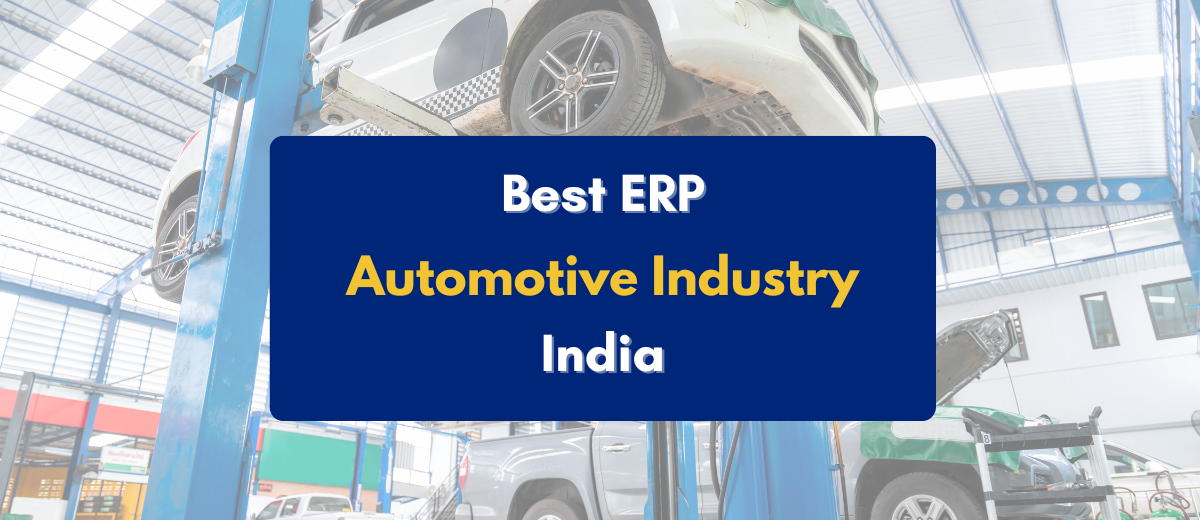Identifying the best ERP for automotive industry can transform your business, improve decision-making and help achieve seamless integration across departments.
This guide explores what you should be looking for in an automotive ERP. We also compare leading ERP systems, their key features, limitations and more.
Why Automotive Companies Need An ERP?
Managing Complex Supply Chains
Automotive companies work with hundreds of suppliers and ERP software helps track raw materials, shipments, and deliveries in real time.
Improving Production Efficiency
With ERP, companies can automate production planning and scheduling. It reduces errors, cuts down delays, and increases output.
Staying Compliant with Indian Regulations
India has strict rules like GST, TDS, and other tax regulations. An ERP automatically calculates taxes and generates compliant reports.
Better Inventory Management
ERP systems give automotive companies full control over inventory. They can see stock levels, predict shortages, and reorder parts before running out.
Seamless Integration Across Departments
ERP connects -Finance, HR, Production, Sales—every department – into one system. Everyone has access to the same real-time information.
Cost Reduction and Higher Profits
Automating operations reduces waste, saves money, and boosts efficiency. ERP provides useful insights through reports, dashboards on data that helps users to identify areas where companies are losing money—and helps fix them fast.
Cloud ERP for Remote Management
Many ERPs today are cloud-based. This can help companies manage their operations from anywhere. This is perfect for businesses with multiple factories or remote teams.
How ERP Supports Auto OEMs vs Auto Parts Suppliers?
ERP systems play a critical role in the automotive industry, be it for automotive OEMs (Original Equipment Manufacturers) or auto parts suppliers.
Here’s how they support these sectors with different focus areas.
ERP Support to Auto OEMs
OEMs build complete vehicles. They deal with thousands of parts, hundreds of suppliers, and complex production lines.
ERP helps OEMs by:
- Supply Chain Integration: Tracks every part from supplier to production line.
- End-to-End Vehicle Production Planning – Tracks complete assembly from parts to finished vehicles.
- Inventory Optimization: Keeps the right parts ready at the right time.
- Compliance Management: Handles quality checks, safety standards, and taxes.
- Global Collaboration: For OEMs selling worldwide, ERP connects factories across borders.
- After-Sales Service Integration – Links production data with service centers for warranties & recalls.
ERP Support to Auto Parts Suppliers
Auto parts suppliers focus on manufacturing specific components. Their challenges are different from OEMs.
ERP helps suppliers by:
- Order Management: Tracks custom orders from multiple OEM clients.
- Inventory Control: Manages raw materials and finished goods.
- Production Scheduling: Ensures on-time delivery to OEMs.
- Quality Assurance: Maintains strict standards demanded by OEM customers.
- Financial Management: Tracks payments, GST filing, and vendor billing.
- Cost Control – Tracks material, labor, and scrap to maintain profitability.
- Flexible Production Scheduling – Adapts to frequent OEM order changes and mixed-model production.

Features the Best ERP for Automotive Industry Must Have
When picking the best ERP for the automotive industry in India, these are the must-have features:
End-to-End Supply Chain Management
Your automotive ERP should manage the entire supply chain from raw material sourcing to delivery of finished vehicles.
Look for:
- Real-time visibility across suppliers, procurement, and logistics
- Demand forecasting to optimize inventory and reduce shortages.
- Supplier collaboration for seamless raw material sourcing.
- Just-in-Time (JIT) & Lean inventory support to minimize waste.
Production Planning & Scheduling
Ensure that the ERP automates production planning to aid faster manufacturing and on-time vehicle delivery.
Look for:
- Advanced planning tools for efficient production sequencing
- Capacity optimization to balance workloads and avoid bottlenecks
- Real-time adjustments based on demand changes or disruptions
- Integration with IoT & automation for smart manufacturing
Shop Floor & MES Integration
The best ERP connects with the Manufacturing Execution System (MES) on the shop floor, so that you get real-time updates straight from the factory floor.
Look for:
- Live monitoring of machines, labor, and production status.
- OEE (Overall Equipment Effectiveness) tracking for productivity.
- Paperless workflows with digital work instructions.
- Defect tracking & root cause analysis for quality control.
Vehicle Configuration Management
Every car or bike model can have multiple variants. This needs to be monitored effectively.
Look for:
- Support for complex BOMs (Bill of Materials) with multiple variants.
- Modular assembly tracking for different vehicle models.
- Customer-specific customization handling (e.g., color, features).
Warranty & Recall Management
Problems can happen, and having this ERP feature protects your brand and keeps customers happy.
Look for:
- Automated warranty claims processing with dealer integration.
- Recall tracking to identify affected vehicles quickly.
- Service history management for compliance & customer satisfaction.
Inventory & Warehouse Optimization
Good automotive ERP systems handle huge inventories.
Look for:
- Multi-location inventory tracking (plants, warehouses, dealers).
- ABC analysis & automated replenishment.
- Barcode/RFID integration for real-time stock updates.
Dealer & Aftermarket Management (For OEMs)
OEMs must support dealers and aftermarket service. This improves dealer satisfaction and boosts customer loyalty.
Look for:
- Centralized dealer portal for orders, parts, and service requests.
- Spare parts management with demand forecasting.
- CRM integration for customer service & loyalty programs.
Costing & Financial Control
Good financial control means better profits for every industry
Look for:
- Activity-based costing for accurate product pricing.
- Real-time budget vs. actual tracking.
- Profitability analysis per model, plant, or region.
GST & Indian Compliance Handling
In India, GST and tax rules are strict. Make sure ERP has compliance features.
Look for:
- Automated GST invoicing & e-way bill generation.
- Tax filing & reporting as per Indian regulations.
- SEZ & export-import compliance support.
Quality Management System (QMS)
Quality is non-negotiable in automotive manufacturing. Higher quality means fewer recalls and bigger profits.
Look for:
- Defect tracking & CAPA (Corrective & Preventive Actions).
- ISO/TS 16949 & IATF 16949 compliance.
- Supplier quality audits & non-conformance reporting.
Cloud-Based Flexibility
Modern ERPs are moving to the cloud which is perfect for growing Indian automotive companies.
Look for:
- Scalability to handle growing operations.
- Remote access for dealers, suppliers, and management.
- Disaster recovery & data security.
Customization and Localization
Make sure the ERP has customization options since oo two auto companies are the same.
Look for:
- Adaptability to regional business practices.
- Multi-language & multi-currency support.
- Configurable workflows for different OEMs & suppliers
Strong Vendor Support in India
You may need help with ERP implementation. Choose vendors that don’t make you wait days for help.
Look for:
- Local implementation & training teams.
- 24/7 technical support with quick issue resolution.
- Regular updates for compliance & features.
Analytics and Reporting Tools
Data is everything and the ERP should provide you insights to help you make faster, smarter decisions.
Look for:
- Real-time dashboards for KPIs (OEE, downtime, sales).
- AI-driven predictive analytics for demand & maintenance.
- Custom reports for management & regulatory needs.
Best ERP for Automotive Industry in India – Top 7 List
Choosing the best ERP for your automotive compay can be a big decision. Here’s a simple breakdown of the best automotive ERP softwares:
1. SAP S4 Hana
A powerful, real-time ERP, SAP S4 Hana is used by top automotive giants worldwide. It’s known for handling complex operations and massive supply chains.
KEY FEATURES
- Real-time analytics and reporting
- Advanced supply chain and manufacturing management
- Smart inventory and quality control
- Strong GST compliance tools
- Advanced production planning & MES integration
- Vehicle configuration & variant management
- Warranty & recall tracking
LIMITATIONS
- High implementation cost
- Customization requires expert consultants
- Long implementation time
BEST FOR: Large OEMs, tier-1 suppliers, and automotive manufacturers needing scalability & global compliance
2. Oracle NetSuite
This is a cloud-based ERP with strong financials, inventory, and CRM, perfect for automotive businesses wanting flexibility and scalability.
KEY FEATURES
- Cloud-native architecture
- Global multi-location handling
- Easy integration with other Oracle apps
- Real-time inventory & order management
- Dealer & aftermarket support
- Customizable dashboards & reporting
- Multi-currency & GST compliance
LIMITATIONS
- Limited shop floor control (needs MES integration)
- High subscription costs over time
- Requires customization for deep automotive needs
BEST FOR: Mid-to-large automotive suppliers, distributors, and aftermarket businesses needing cloud access.
3. Infor CloudSuite Automotive
Designed specifically for automotive manufacturers and suppliers, this is a cloud based ERP system. It’s known for its flexibility, industry-specific KPIs, and unified system approach.
KEY FEATURES
- Built-in automotive industry templates
- Strong shop floor and MES integration
- Supplier collaboration tools
- Real-time production visibility
- Warranty & recall management
- AI-driven demand forecasting
LIMITATIONS
- Can be complex to configure
- Not the cheapest option
- Limited local support in India
BEST FOR: Automotive manufacturers needing deep industry-specific functionality without heavy customization.
4. IFS Applications
It offers flexible ERP modules that fit the automotive sector’s dynamic needs. It’s great for companies needing strong project management along with manufacturing.
KEY FEATURES
- Flexible modular system
- Asset management and project tracking
- Service and maintenance management
- Real-time manufacturing execution
- End-to-end supply chain tracking
- Shop floor & quality management
- Aftermarket service & warranty handling
LIMITATIONS
- Fewer local Indian partners
- Training users can take time
BEST FOR: Automotive businesses managing complex projects and asset-heavy operations.
5. Sage X3
This is a great ERP for mid-size automotive companies wanting simple, powerful tools without unwanted complexity.
KEY FEATURES
- Good inventory and warehouse management
- Financials and GST-ready accounting
- Streamlined supply chain tracking
- Fast implementation time
- Multi-plant & multi-currency support
- Custom reporting & analytics
LIMITATIONS
- Limited high-end manufacturing functionality
- Not ideal for very large enterprises
- Limited dealer management features
BEST FOR: Small to mid-size automotive parts suppliers looking for a budget-friendly ERP.
6. Microsoft Dynamics 365
This is a versatile cloud ERP with strong CRM and finance integration, suitable for automotive businesses.
KEY FEATURES
- Cloud and hybrid deployment options
- Excellent CRM + ERP integration
- Power BI analytics built-in
- Strong partner ecosystem in India
- Dealer & customer service management
- Production & inventory optimization
- GST & compliance support
LIMITATIONS
- Customization costs can add up
- Less specialized than SAP/Infor
- Needs skilled teams for complex setups
BEST FOR: Auto companies wanting full flexibility and seamless CRM+ERP.
7. Turbo ERP
This is specifically designed for Indian automotive OEMs and suppliers. It’s affordable, fast to implement, and built for local businesses.
KEY FEATURES
- GST, e-way bill, and Indian tax compliance
- Inventory & production tracking
- Affordable pricing
- Local vendor support
- Vendor and customer tracking
- Fast and easy reporting
LIMITATIONS
- Limited advanced automotive features
- Not ideal for large OEMs
BEST FOR: Small to mid-size Indian auto parts manufacturers wanting a simple, budget ERP.
Frequently Asked Questions
1. What specific needs of the automotive industry should an ERP address?
It should be able to handle complex bills of materials (BOMs), production scheduling, supply chain management with multiple tiers of suppliers, stringent quality control, regulatory compliance, and efficient inventory management of diverse components.
2. Is cloud-based ERP a good option for automotive businesses in India?
Yes, they offer benefits like scalability, accessibility across multiple locations, and reduced IT infrastructure costs. However, factors like internet reliability and data security requirements should be considered.
3. What is the typical implementation timeline for an automotive ERP system?
This can vary significantly based on the size and complexity of the automotive business, the chosen ERP vendor and modules, customization needs, and deployment model.
4. How can automotive businesses ensure a successful ERP implementation?
Factors include clearly defining business goals, selecting the right ERP vendor and solution, ensuring strong project management, thorough data migration and cleansing, comprehensive user training, and ongoing support.
5. What future trends in ERP are relevant to the automotive industry in India?
Future trends include increased adoption of cloud ERP, integration of IoT, greater use of AI and machine learning, enhanced mobile accessibility, and a focus on sustainability and circular economy aspects.

 Expert verified
Expert verified 

